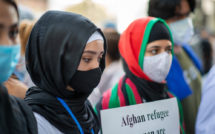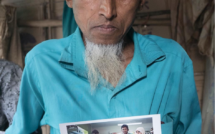

This is an introduction to our Campus Spotlight on Sarah Lawrence College, and part of our special feature, Displacement, Memory, and Design.
The Migration and Mobilities working group at Sarah Lawrence College is a core group of faculty from across the social sciences and humanities who have been variously engaged in the interdisciplinary studies of human mobility, displacement crises, migration, and other related themes. Through prior and ongoing efforts and initiatives, this group of faculty has strived to bring attention to one of the most significant areas of concern in the world today: migration, along with that of climate change and political crises. Human migration, mobility, and displacement, as well as climate crises, are issues that we, as faculty who teach across our various disciplines, believe continue to grow as areas of interest and engagement among students who are keen on learning.
The Migration, Mobilities and Social Justice working group consists of four Sarah Lawrence faculty members: Deanna Barenboim (Psychology & Anthropology), Luisa Heredia (Public Policy), Parthiban Muniandy (Sociology) and Philipp Nielsen (History). The faculty in the group use research and pedagogical approaches that are focused locally, nationally, globally, and transnationally, and we have been teaching a range of subjects including migration, public policy, mobility studies, immigration, and law, Native American and Indigenous Studies, social movements, the history of displacement and forced migration, literature, and music. These faculty members have been leveraging Sarah Lawrence’s uniquely interdisciplinary open curricular approach to the liberal arts to develop and offer robust and diverse courses and opportunities with these interrelated themes—including the signature “conference seminars” (that include yearlong courses within each discipline), lectures, international programs, and other multi-disciplinary projects—that go along with the faculty’s own expertise.
The Working Group has previously organized multiple symposiums and forums that brought together faculty, students, and community organizers at the college with a goal of bridging the gap between academic institutions of higher learning and public engagement on key social problems and issues today. Such townhalls and forums have been jointly supported through the various collaborations within our faculty groups, community partnerships and the Consortium on Forced Migration, Education, and Displacement. By bringing in speakers, scholars, advocates, and activists to engage in a public discussion through these town halls (especially at events that proved to be extremely well-attended and well-received) we have been able to recognize the importance and significance that our students place on addressing and discussing the nuances of displacement and migration today.
The faculty in the Migration and Mobilities Working Group at Sarah Lawrence are also working to provide a more focused and robust curricular path for students who are interested in a deeper learning experience in these areas. By having faculty who can teach from across various disciplines, we are able to develop and offer courses (seminars and lectures) that give students an opportunity to engage with more advanced and complex material. We recognize, for one, the importance of the lens of mobilities as a critical framework in the humanistic study of people’s lives, which fundamentally shapes our understanding of the human experience. We recognize as well that scholars in mobilities studies have been paying attention to a range of interests: the geographic movement of people, goods and ideas across landscapes, boundaries, and borders; technological innovations and human connections forged in and through social media; and the connections between physical movements and social movements. Thirdly, and consequently, we recognize that this interdisciplinary lens enables us to understand enduring and new forms of ethnic, social and political identities, cultural formations, linguistic forms, and textual and artistic representations that emerge through various kinds of movement. This analytic lens further highlights the structural forces that produce differential access to freedom of movement not only across geographic boundaries and borders but also across individuals’ and communities’ distinct experiences of race, ethnicity, gender, sexuality, class, and their intersections.
Within the open curriculum of Sarah Lawrence, students with a strong interest in particular interdisciplinary areas of study, such as that of migration and mobilities, have historically relied upon improvised, ‘cobbled-together’, sets of courses to build their experience and knowledge. This has long been an integral part of the Sarah Lawrence approach to empowering students to design their own areas of study. As the working group, we seek to continue facilitating this student engagement by connecting with faculty across the disciplines in order to further solidify migration, mobilities, and social justice as an accessible area of study for all students.
Core Faculty and Courses in the Area:
Deanna Barenboim
- Long-term Guest Faculty member, Sarah Lawrence College (2009-2017; 2018-Present) Mellon Postdoctoral Fellow, Native American and Indigenous Studies, Center for the Americas, Wesleyan University (2017-2018)
- Course Areas: Anthropology, Psychology, Indigenous Studies, Latin American and Latinx Studies
- Cluster Courses: Indigenous Rights and Representations; Indigenous Mobilities; Immigration and Identity; Illegality and Immigration; Migration and Experience; Spaces of Exclusion, Places of Belonging; Culture, Power, and Violence in Latin America; Culture and Mental Health
Luisa Heredia
- Joanne Woodward Chair in Public Policy, Sarah Lawrence College, Tenured Faculty Member Course Areas: Public Policy, Latin American and Latinx Studies
- Cluster Courses: Immigration Policy; Illegality and Migration Control Regimes; Citizenship, Illegality, and Belonging; Wall and Cages, Policing and Incarceration; Arts, Identity, and Activism; Popular Culture and Politics
Parthiban Muniandy
- Faculty in Sociology, Sarah Lawrence College & Faculty Director for the Consortium on Forced Migration, Displacement and Education (2019-2021)
- Course Areas: Transnational Sociology, ethnography, migration, displacement, urban studies Cluster Courses: Borders, Nations and Mobilities (yearlong seminar), Refugee and Asylum Crises (seminar), Cities of the Global South, Informality and Everyday Cosmopolitanism, Sociology of Global Inequalities (Lecture)
Philipp Nielsen
Faculty in History, Sarah Lawrence College, Tenured Faculty Member Course Areas: European history, Architectural History, History of Ideas
Cluster Courses:
- We Refugees: A History of Displacement in Modern Europe (seminar)
- European Imperialism: Violence, Knowledge, and Migration since the 19th century (lecture)
- Postwar: Europe on the Move (lecture)
- Made for Germany? Exporting Products and Importing Labor (seminar)
- The Urban Century (seminar); Pluralism and its Discontents (seminar)
Parthiban Muniandy researches temporary labor migration in Southeast Asia and South Asia, with a particular interest in exploring how new regimes of migration are emerging, under which “temporary labor” migrants are becoming increasingly commonplace in fast-developing societies in Asia. He is the author of Politics of the Temporary: Ethnography of Migrant life in Urban Malaysia (2015). His former appointments include Lecturer of Global Studies for the University of Illinois at Urbana-Champaign. He is the director of Sarah Lawrence’s summer research and study program in Kuala Lumpur, Penang, and Ipoh, Malaysia.




